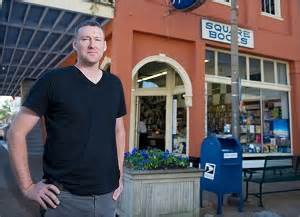A Quote by Avi
I try to write about complex issues--young people in an adult world-- full of irony and contradiction in a narrative style that relies heavily on suspense with a texture rich in emotion and imagery. I take a great deal of satisfaction in using popular forms-- the adventure, the mystery, the thriller-- so as to hold my reader with the sheer pleasure of a good story. At the same time I try to resolve my books with an ambiguity that compels engagement. In short, I want my readers to feel, to think, sometimes to laugh. But most of all I want them to enjoy a good read.
Quote Topics
About
Adult
Adventure
Ambiguity
Books
Complex
Contradiction
Deal
Emotion
Engagement
Enjoy
Feel
Forms
Full
Good
Good Story
Great
Great Deal
Hold
Imagery
Irony
Issues
Laugh
Most
Mystery
Narrative
People
Pleasure
Popular
Read
Reader
Readers
Resolve
Rich
Same
Same Time
Satisfaction
Sheer
Short
Sometimes
Story
Style
Suspense
Take
Texture
Them
Think
Thriller
Time
Try
Using
Want
World
Write
Young
Young People
Related Quotes
There are two qualities that make fiction. One is the sense of mystery and the other is the sense of manners. You get the manners from the texture of existence that surrounds you. The great advantage of being a Southern writer is that we don't have to go anywhere to look for manners; bad or good, we've got them in abundance. We in the South live in a society that is rich in contradiction, rich in irony, rich in contrast, and particularly rich in its speech
You've got to be a good reader. So whatever genre that you're interested in, read a lot of books about it and it's better than any kind of writing class you'll ever take. You will absorb techniques and then in a lot of cases you can just start writing using the style of the book or the author that you admire and then your own style will emerge out of that. Be a diligent reader and then try to write seriously, professionally and approach everything in writing in a professional way.
I don't think about the reader in any conscious way that impacts the writing, as far as, Hey, most readers would like this! But at the same time, if it were presented to me: "John, you're going to write a novel. It's going to take you a few years. When you're done with it, there's a law that no one's allowed to read it." I don't think I would write it. I want someone to read it!
We all become different readers in how we respond to books, why we need them, what we take from them. We become different in the questions that arise as we read, in the answers that we find, in the degree of satisfaction or unease we feel with those answers...In the hands of a different reader, the same story can be a different story.
I don't want to write things that people don't want to read. I would have no pleasure in producing something that sold 600 copies but that was considered very wonderful. I would prefer to sell 20,000 copies because the readers loved it. When I write books I don't actually think about the market in that way. I just tell myself the story. I don't think I'm talking to a 10-year-old boy or a six-year-old girl. I just write on the level the story seems to call for.
I'm not naive, I know that bad things happen, but most people do the right thing most of the time. Most people wake up and they try to do what's right for their relationships, whether it's marriage or family. They try to do what's right for their job. They try to make a better world for those around them, and that's what I want to write about.
Sometimes, a scene goes on too long and, with this being a suspense story and murder mystery that you're trying to discover through her heightened paranoia, you don't want scenes that take you on a tangent. Sometimes, you love those scenes, but you know that it's better not to be in the overall film. So, I'm not sad that they're not in the main movie, but I do think it's fun for people to get to watch them, if they want to.
The desire to be liked is acceptable in real life but very problematic in fiction. Pleasantness is the enemy of good fiction. I try to write on the premise that no one is going to read my work. Because there's this terrible impulse to grovel before the reader, to make them like you, to write with the reader in mind in that way. It prevents you doing work that is ugly or upsetting or difficult. The temptation is to not be true to what you want to write and to be considerate or amusing instead. I'm always trying to fight against the impulse to make my readers like me.
When I get the possibility of using a character like Bruce Wayne or Dick Grayson, I try and think about what's most exciting or interesting about them as a person, so I try and think what they are at their core, or what piece of their psychology do I gravitate toward that I respect, and I'm excited by it when I read books about them.
I want to pick good projects, I want to work with great directors and try not to put too much pressure on myself and just read things for the story and recognize when I'm drawn to something for the right reasons and try to maintain some sanity. Sanity would be good. I'd like to have a little sanity!


































